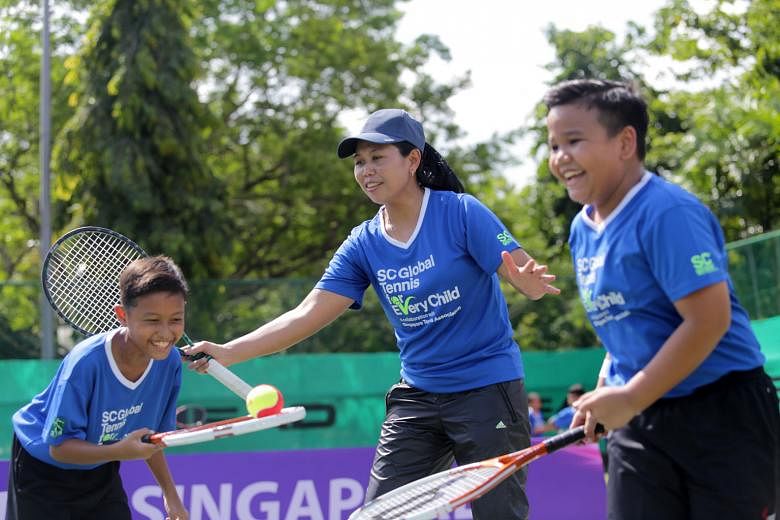Belief and commitment are the two most important traits for any tennis player who wants to turn professional, said former top-20 player Yayuk Basuki.
Said the Indonesian, who reached a career-high singles ranking of world No. 19 in 1997: "I think one of the problems with tennis in South-east Asia is the mentality - sometimes when they play against American or European opponents, they feel intimidated.
"If they have guts and believe in themselves and focus on playing their best tennis, instead of thinking about whether their opponent is the world No. 1 or No. 10, then I'm pretty sure they will perform well."
It has been a struggle for female tennis players around this region to make a name on the professional circuit. The region's highest-ranked women's player is world No. 154 Luksika Kumkhum of Thailand.
Basuki, who was speaking yesterday at the sidelines of a tennis clinic at MOE (Evans Road) Sports Hall, added that another key struggle for aspiring professional players is being constantly on the road.
"You have to be ready to travel nine to 10 months a year," the 45-year-old said. "That's what most of the players find difficult because they feel homesick."
Basuki, whose last tournament was the 2010 Asian Games in Guangzhou, has been a Member of Parliament for the past two years.
She hopes to implement a rule ensuring that athletes in Indonesia are supported even after their professional career has ended.
Said Basuki, who has six Women's Tennis Association (WTA) singles titles and reached the 1997 Wimbledon quarter-finals: "I want to make sure that the country has some sort of pension plan for athletes, so that they don't have to worry about what they will do after they retire."
Yesterday, 36 primary school students from five schools attended the clinic, which was part of the annual SC Global Tennis for Every Child Inter-School Carnival.
The event was held ahead of the BNP Paribas WTA Finals Singapore presented by SC Global, which will take place from Oct 23-30.
While players are still battling for a coveted slot in the tournament, five-time Major champion Maria Sharapova will definitely be absent from this year's edition, as she is serving a two-year doping ban.
When asked if organisers are worried that her absence would affect ticket sales, tournament director Melissa Pine said: "We've got the best eight players in the world who will compete and we're really excited about the line-up that's emerging."
Pine, who is also vice-president of WTA Asia-Pacific, added: "With a new world No. 1 (Angelique Kerber) and three different Grand Slam champions (in Kerber, Garbine Muguruza and Serena Williams) this year, we have so many positives to look forward to."


